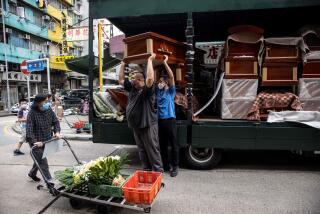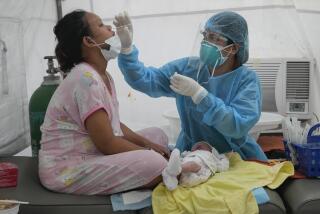Maxi pads, half an orange: Asia’s scramble for surgical masks springs creative solutions
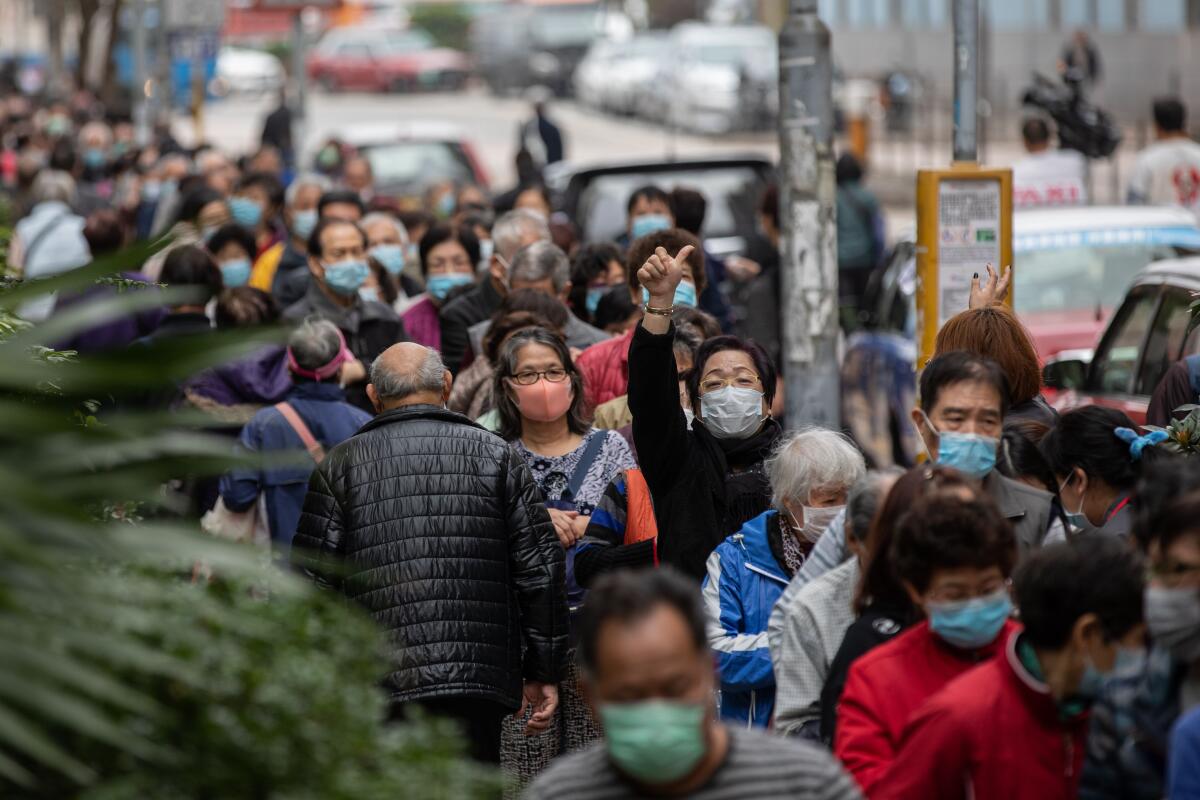
- Share via
TAIPEI, Taiwan — In the prosperous capitals of Asia, money could buy anything — until a mysterious coronavirus hit, striking fear in rich and poor alike.
Now, surgical masks are nearly impossible to find on store shelves from Taipei to Hong Kong to Manila, prompting a panic reminiscent of wartime scarcity, with long lines and reports of hoarding, price gouging and fake products.
People have turned to social media to share creative solutions. How about a mask made of a maxi pad? Half an orange? A water bottle? Bad advice abounds. Note to self: Steaming masks to disinfect them does not work.
Some governments have organized mask lotteries. Others are rationing masks. Political leaders tour mask factories, seeking to reassure citizens that manufacturing is being ramped up. On an increasingly interconnected continent, every major Asian city has extensive business and tourism ties with China, where the deadly outbreak originated.
At their simplest, the masks are a thin, pleated layer of gauze — a few millimeters of protection from the world. Other versions, like the N95 used by healthcare workers, contain advanced carbon filters. Most people are just glad to have a mask in standard white, blue, green or black, but plaid, camouflage, heart and cartoon animal versions are also seen on the streets.
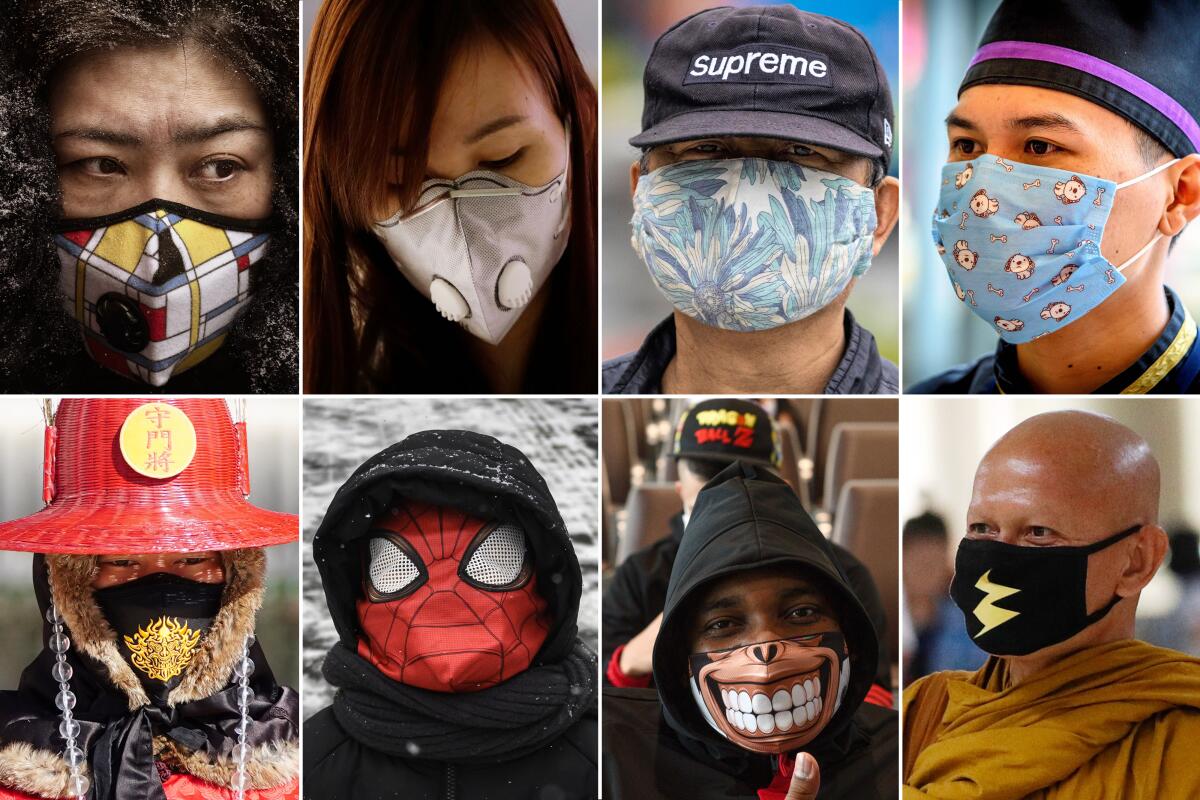
People in China, Japan and other parts of Asia are accustomed to donning surgical masks to fend off pollution or germs, as well as to protect others from sneezes and coughs. Many have a small stash at home, but that will last only so long.
Medical experts say it is more important to wash your hands than to wear a mask. Early indications are that the new strain of coronavirus, which causes flu-like symptoms and has killed more than 700 people, is less lethal than 2003’s SARS virus. Cases have been confirmed in two dozen countries, but the vast majority are in the Chinese city of Wuhan and the surrounding province of Hubei.
As conditions deteriorate in Wuhan and other parts of China, life has proceeded with limited disruption elsewhere in Asia, other than the extension of school vacations in some areas and an undercurrent of paranoia. For those uncomfortably close to the outbreak’s epicenter, surgical masks provide a degree of insurance against an unseen enemy.
In some corners of the internet, the masks have become a new form of chic. Instagram influencers have seized on the trend, striking glamorous poses in masks while urging their followers to adopt good hygiene habits and support those affected by the outbreak.
“PREVENTION is better than cure. Let’s pray that we can get through this together. All stores MASK OUT OF STOCK,” wrote Adena Wilson from the Philippines, who has 27,700 Instagram followers, under a photo of herself in an off-the-shoulder top and black face mask.
In China, where the outbreak has rippled beyond Hubei province, masks are such a precious commodity that officials in southwestern Yunnan province co-opted a shipment meant for the city of Chongqing. A municipal health official was fired over the incident. The BBC reported that China, one of the world’s largest producers of surgical masks, imported 220 million masks between Jan. 24 and Feb. 2.
Communist Party members in the city of Xian banded together to sew homemade masks with two layers of gauze, two layers of white cloth and one layer of plastic wrap, washed three times with disinfectant. Nearly 200 households received two masks apiece.
The local government of Xiamen in Fujian province has launched a lottery system for mask purchases through the WeChat messaging app. Winners can buy six masks from designated local stores. Nanjing is among the cities instituting online reservation systems for masks.
Shortly after news of the coronavirus broke in late January, masks began selling out across Southeast Asia — an indication of how tightly interwoven this region is.
The virus could easily spread through tourists, migrant workers and factory supply chains that benefit the economies of many countries.
In the Malaysian state of Sabah, a popular draw for Chinese sunbathers and snorkelers, drugstores quickly sold out of face masks. Earlier this week, President Rodrigo Duterte of the Philippines reassured his country that stockpiles of face masks would be replenished after being depleted by panicked buyers.
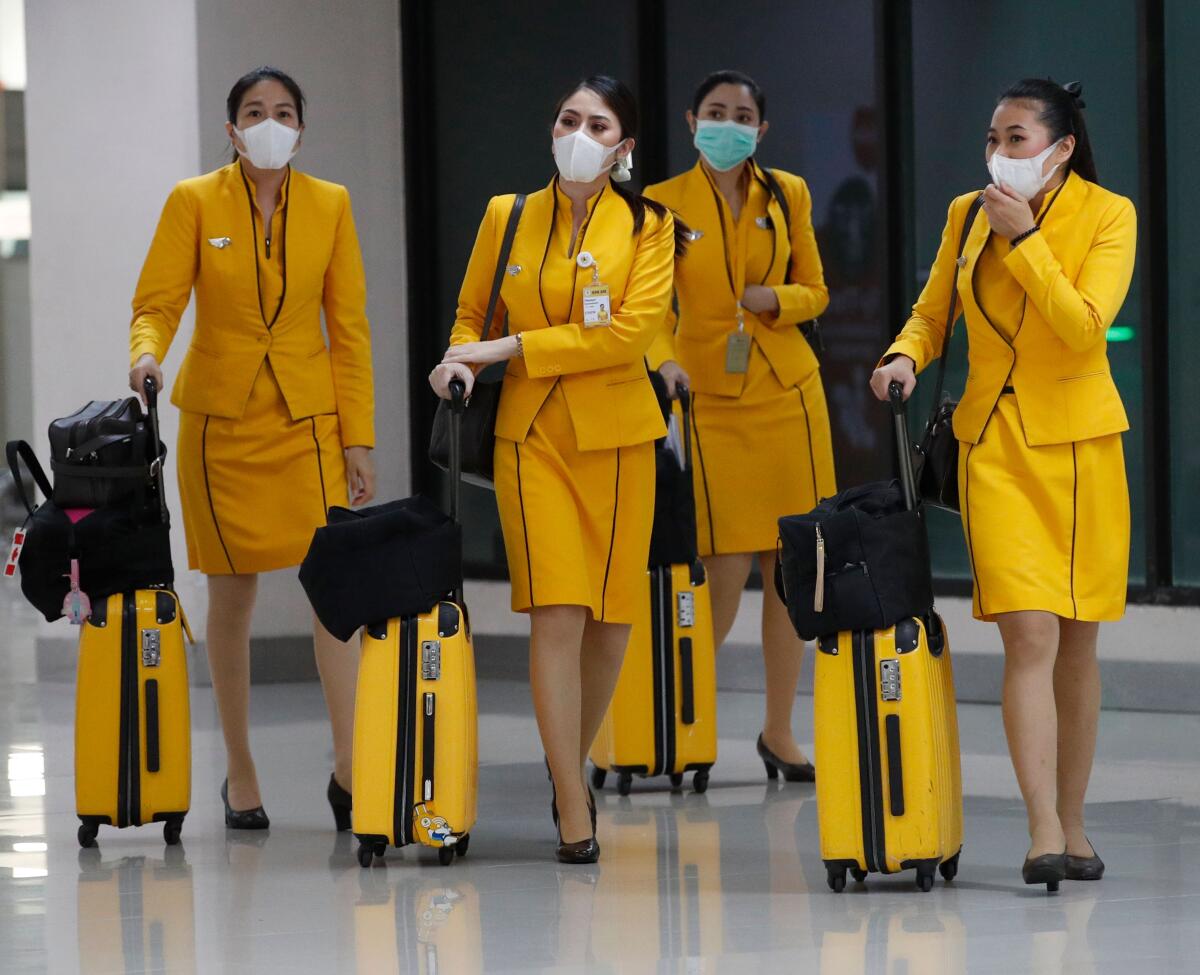
The health minister in Thailand handed out free masks to passersby Friday, then provoked controversy by berating European tourists who refused to take them, saying they should be “kicked out” of the country.
Singapore, which has 30 confirmed coronavirus cases, the most outside China, responded to the outbreak with typical efficiency. Each of the city-state’s 1.3 million households was allotted four masks, with soldiers working around the clock to prepare the packages.
A government website helped residents figure out when and where to collect the white surgical-style masks, which come with a label stating: “Do not use this if you are well.”
Many Singaporeans seemed to be following the directive, with only a slight increase in the numbers of people wearing masks on the streets. Still, many drugstores were sold out.
In Hong Kong, where pro-democracy street protests have been ongoing for months, the situation was more chaotic as lines outside chain drugstores stretched for blocks.
A box of 50 masks that cost $8 before the outbreak now fetches around $40.
Some mom-and-pop pharmacies carry masks, but Hong Kongers say they have seen piles of them loosely packed in plastic bags. Social media videos show people scavenging masks from garbage cans.
Popular anger has been directed at the Hong Kong government and its chief executive, Carrie Lam, who are accused of responding too slowly to the outbreak and putting people at risk by refusing to completely seal the border with China. The virus has sickened about two dozen people in Hong Kong, killing one.
The government says it has ordered more face masks and boosted production in the city’s prisons, where inmates churn out tens of thousands per day.
South Korean officials are cracking down on people trying to profit off the mask shortage. Hoarding of masks is now punishable by prison or fines. People can report abusive sales tactics to a tip line and website, with nearly 200 inspectors assigned to investigate.
In the capital city of Seoul, many stores are sold out of masks. Meanwhile, officials are distributing free masks on buses and at subway stops, as well as to the needy. Some masks in government packaging are advertised online, raising concerns that they are being resold for profit.
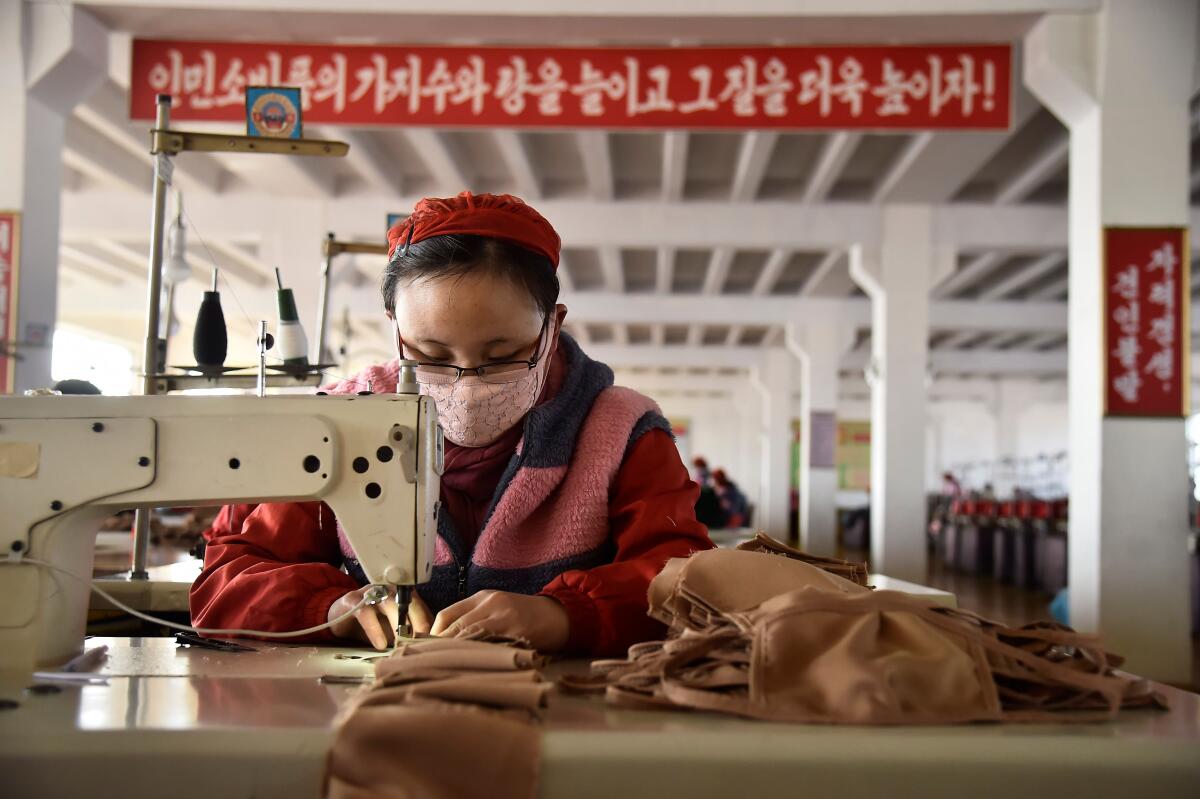
North Korea says it is boosting mask production. An illegal mask trade may also be flourishing in the secretive, authoritarian country, with smugglers hawking South Korean-made masks near the border with China, according to Daily NK, a Seoul-based news site with sources inside North Korea.
In Taiwan, many are desperately seeking masks despite assurances from government officials that people need facial protection only if they are ill or in crowded places. On the self-governing, democratic island, which China claims as a renegade province, nearly every crisis relates back to the mainland.
Images of masks imprinted with the Taiwanese national flag were widely shared online. Chinese people should be forced to wear these, commenters joked sardonically — China does not recognize Taiwan as a country and will not allow Taiwan to join the World Health Organization.
At first, convenience stores were authorized to sell masks three at a time. Officials scrapped that system after long lines and shortages, in favor of a new rationing system that began Thursday.
But, so far, there only seemed to be more long lines and more shortages.
At Li Tai Pharmacy in Taipei’s Daan district on the first day of the new system, a stream of customers arrived asking for masks.
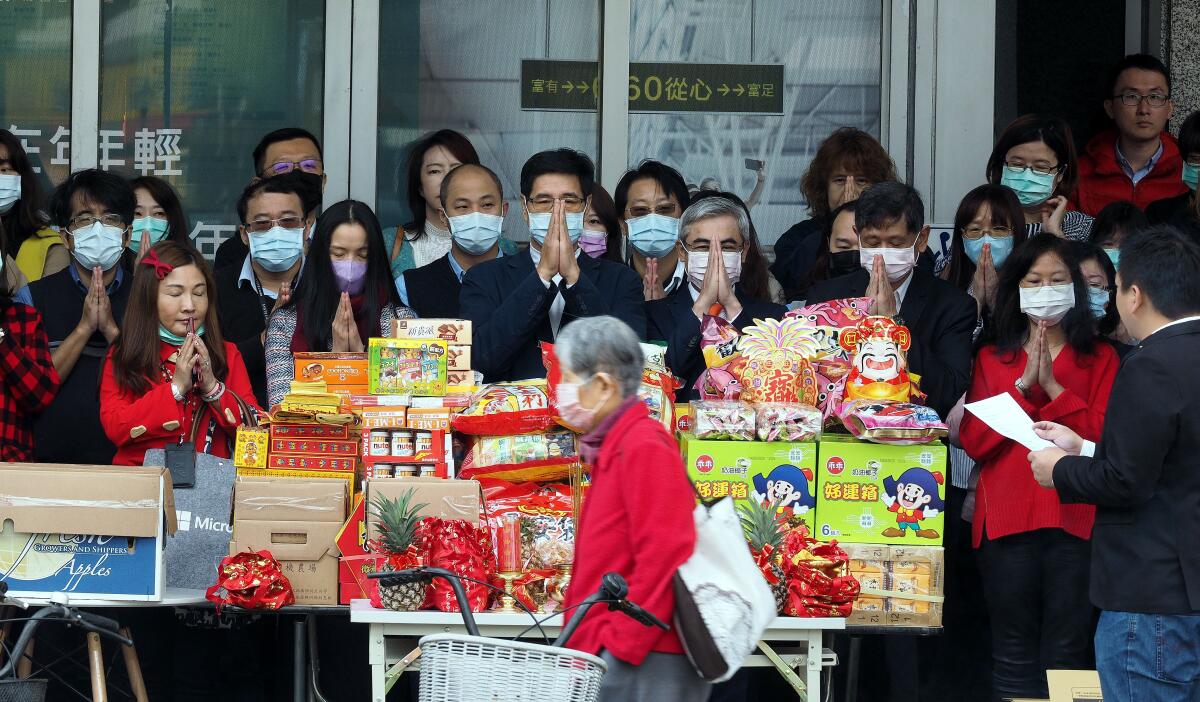
The store’s daily allotment of 200 adult masks had been sold out since 9 a.m., though some children’s masks were still left.
A harried store manager said he had planned to start selling the masks in the afternoon because the computer system for logging the purchases was not ready. But people who had waited outside the store since 8 a.m. protested. So the manager collected their ID cards and sold them each two masks for five New Taiwan dollars, or about 17 cents, apiece — a price set by the government.
On Tuesdays, Thursdays and Saturdays, people with even-numbered ID cards can purchase masks — a maximum of two per week. Mondays, Wednesdays and Fridays are for odd-numbered cards. On Sunday, everyone is allowed to buy.
“They’re already gone?” said a man in a black mask. “What good is this?”
Another customer, Morgan Tsai, bought gauze so she could fashion her own face masks. The green mask she wore was given to her by a friend, she said, and she had been reusing it often.
She does not believe the advice from government officials that most people do not need to wear masks.
“If everyone believes that, why are they in line to buy masks?” said Tsai, who is in her 40s and works in marketing. “If the government spoke honestly and transparently, people wouldn’t panic.”
“May I interrupt?” asked a bare-faced elderly man. “I have diabetes, and I don’t have enough masks. How do I even get any? All I can do is stay home.”
Chang reported from Taipei, Taiwan; Bengali from Singapore; and Kim from Seoul. Nicole Liu and Gaochao Zhang of The Times’ Beijing bureau, Times staff writer David Pierson in Singapore, special correspondent Tang Wai Yin in Hong Kong and special correspondent Ralph Jennings in Taipei and Kota Kinabalu, Malaysia, contributed to this report.
More to Read
Sign up for Essential California
The most important California stories and recommendations in your inbox every morning.
You may occasionally receive promotional content from the Los Angeles Times.
